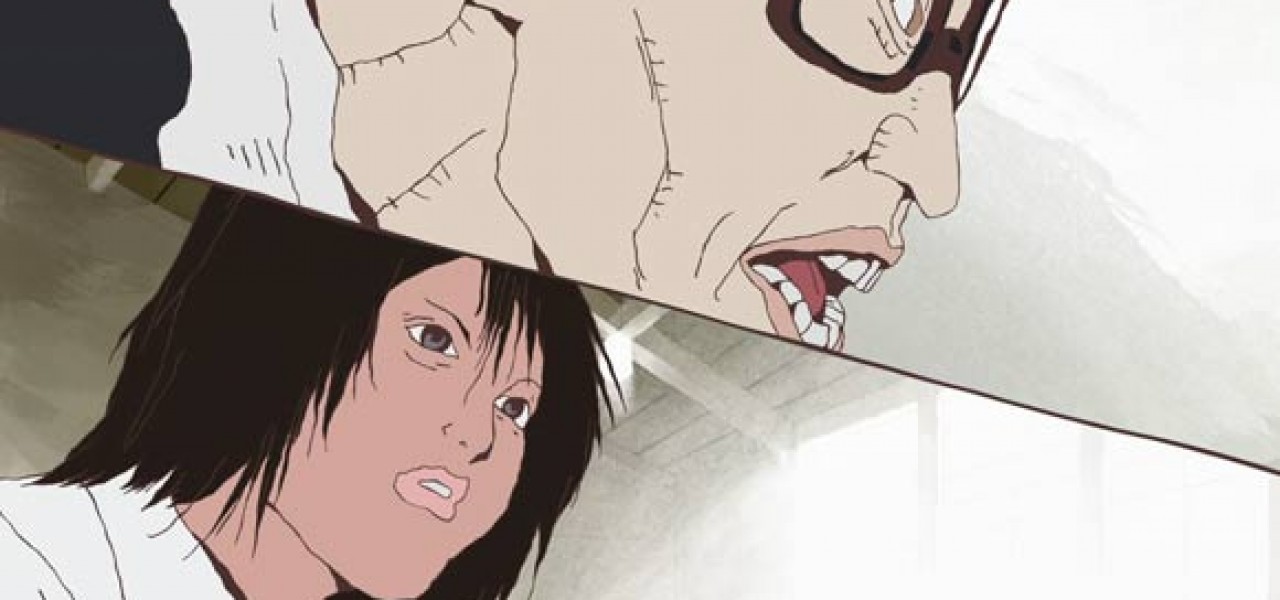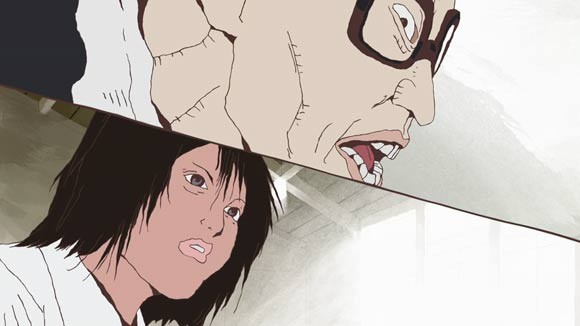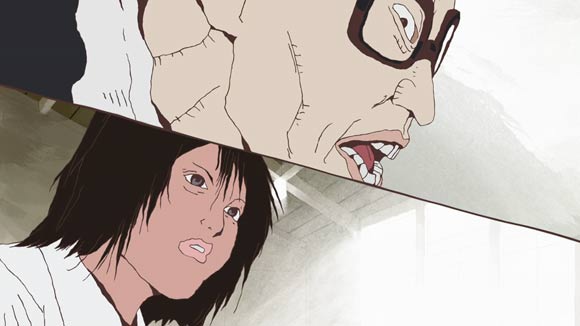

‘Ping Pong’ Recap: ‘Where Did I Go Wrong?’ (Ep. 5)

Ryuichi Kazama continues his victorious streak with a singles win at the Youth Olympics, while Sakuma and Peco realize they aren’t cut out for the sport after witnessing Smile’s continued improvement.
At the halfway point in the story, we seem to be in a transitional stage in which the relationships of the players to one another and their attitude towards the sport are changing. The episode didn’t have much tension to it partly as a result of that. There was no strong driving narrative force. That made it one of the less memorable episodes so far.
Each episode can be said to focus on one of the characters, and the focus of this episode was on Sakuma. A less than sympathetic character up until now, Sakuma’s defeat and subsequent angry outburst betrays him as in fact the most vulnerable character of the lot: a bootstraps kind of guy who struggled valiantly to achieve, but still came up short. His frustration was palpable and understandable during the climactic match.
Seeking to regain the favor of his idol Ryuichi, Sakuma challenges Smile to a do-or-die match. Defeat means expulsion from Kaio. Smile proceeds to crush Sakuma and, for good measure, tell him the harsh truth: It’s not just about effort. You don’t have the talent for table tennis.

Change, if anything, was the theme of the episode. Watching the characters grow and change has been the most satisfying aspect of the series for me at this point. Victory can be exhilarating, but the moments of defeat are the most humanizing. Ryuichi Kazama seems opaque and one-dimensional, whereas Kong, Peco and Sakuma seem to take on more personality in their defeat.
I like how the episode showed several of the characters at their most vulnerable and unsure. Peco losing sight of his purpose and wallowing in the pure aimlessness of summer makes for a more believable adolescent than the disciplined and soldierly students of Kaio Academy.

Peco and Smile were good friends, but suddenly a rift seems to have formed as Peco becomes aware that his friend is the one blessed with talent. They seem to be at that awkward stage where childhood friends begin to mature in different directions and grow apart. Yuasa is good at depicting these subtle flutterings of the heart in an understated way, as we get all this without having to have it bludgeoned over our heads with wordy dialogue.
Yurie got a little more screen time, but she still seems a little underdeveloped and tacked on. It’s not clear yet why she’s there. Egami, the guy who lost to Smile early in the championships and went to the ocean, makes a brief appearance, but he’s also a mysterious character whose sporadic presence doesn’t add anything for the moment.

On the technical side, the animation of episode 5 was somewhat underwhelming, if basically similar to previous episodes. There weren’t any animation highlights, although there were a handful of dynamic shots at the beginning of the climactic match when Smile serves. The scene that stood out most was the beach scene, but as much as I like rough and idiosyncratic animation that is full of personality, I found the movement there simply messy and incomprehensible. Tamotsu Ogawa is known for this kind of weird, loose animation, so maybe this part was by him.
The directing of the episode was also somewhat slack and lacking in tension, although basically in the same style due to the fact that Yuasa is storyboarding every episode. The cross-cutting has lost a bit of its novelty and become somewhat rote. I also don’t quite see the point of continuing to flash the name blurbs on the screen.

Yuasa’s previous shows had, by their fifth episode, each produced quite a bit of standout work in either the directing or animation. Ping Pong, in comparison, feels like it has been treading water the whole time, more often than not feeling like it could have been done a bit better if they had had a reasonable schedule. There’s nowhere near the schedule to permit someone like Michio Mihara to spend months animating an episode the way he did in all of Yuasa’s previous shows, so we probably won’t be seeing a Mihara episode this time around. Luckily we were treated to one in Space Dandy recently.
The “key animation animation director assistance” credit is one I’ve never seen before. I take it to mean this person corrected the key animation while the main animation director corrected the layouts. In anime, a key animator draws the layouts, which are checked by the episode director and animation director before the key animator can proceed to draw the actual key animation.
Ping Pong Episode 5: Where Did I Go Wrong?
| Storyboard: Script: Series Structure: |
Masaaki Yuasa | |
| Episode Director: | Masaki Utsunomiya | |
| Chief Animation Director: | Nobutake Ito | |
| Animation Director: | Kenichi Ishimaru | |
| Key Animation A.D. Assistance: | Izumi Yamanaka | |
| Key Animation: | Maki Fujita | Hiroyoshi Iida |
| Shigeru Uchihara | Yumiko Ishii | |
| Tamotsu Ogawa | Izumi Yamanaka | |
| Hiroshi Suzuki | Katsuji Matsumoto | |
| Shigemi Aoyagi | Hong Seunghyun? | |
| Kaoru? Nagakawa | Nobuyuki Kitajima | |
| Kenichi Ishimaru |
